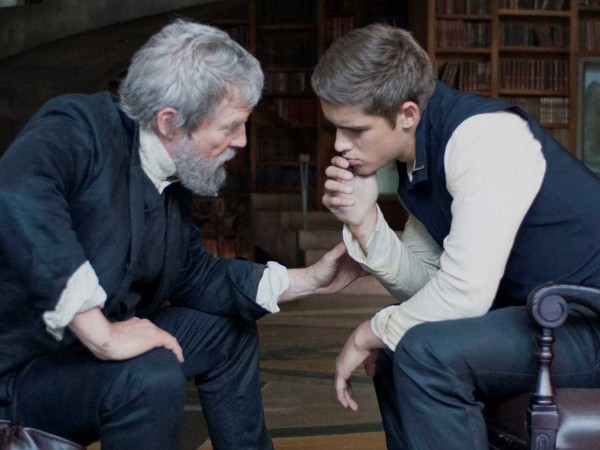Louis Lowry published The Giver in 1993, before The Hunger Games or Divergent, which precede the story in film but were surely influenced by it in print. The Giver made a big impact, winning a Newbery medal and making its way into countless middle school reading lists.
For a generation, the book is a beloved classic that mirrors a child’s own growing awareness of the vibrancy of life, the horrors of loss and injustice, and the joys of love.
The film adaptation opening this week does justice to its source material with faithful directing and fantastic acting.
The story follows Jonas (Brenton Thwaites), a youth transitioning from childhood to the first trappings of adulthood in an orderly, futuristic supposed-utopia. Everything is clean, safe, nice, and just a little creepy. In this society, family is assigned at birth, vocation dictated at adolescence, and language carefully monitored.
Jonas, however has a different destiny. He is chosen to be the next memory keeper and apprenticed to an older man he calls the Giver (Jeff Bridges). The Giver alone holds the memories of humanity, which he shares with Jonas through a psychic connection.
It is not so much that Jonas learns of past joys like riding a sled or past horrors such as war, it is more that he becomes aware of a whole realm of experience that has been kept from him. As he becomes aware, his senses brighten and his moral sense sharpens.
The society in which they live, headed by the Chief Elder (Meryl Streep), seems to have eliminated strife, sorrow and pain. However, there are costs, horrifying costs. Once Jonas has awoken to the realities of the costs, he can no longer stay complacent.
The book has at its heart a description of a visual phenomenon – I won’t elaborate and ruin the surprise – which is so well-written that lovers of the book will worry that it doesn’t translate well to screen. Director Philip Noyce does a great job bringing this visual conceit to life.
Even with good directing, however, the film would have felt small without the fantastic performance by Jeff Bridges in the titular role. He brings a gravitas and depth to an allegorical role that draws the viewer in just as Jonas is drawn in. Bridges, who has been deeply invested in this project for 20 years, meets his match in Meryl Streep. Their final scene alone, which lays out the philosophical underpinnings of the movie, is worth the price of admission.
Although the story is exciting, and deeply creepy with a spine-chilling turn by Alexander Skarsgard as a horrific father figure, action defers to theme.
The Giver is a thinking movie.
“My personal belief is that us human beings,” Bridges told Patheos in a phone interview, “Probably most animals, are kind of addicted to comfort. We like being comfortable and there’s a price to that. What are we willing to pay and what are the true costs of being comfortable and happy?”
“I think although the movie takes place in some future time that it is very relective of our own and there’s a bit of a cautionary tale of how us humans roll and what we’re capable of. And the brutality and the subtleties of our brutality toward each other and also the love and the strength that’s inherent in us.”
Humanity is forever flawed and it’s Jonas’s duty to fight the flaws, just as it is every human being’s duty to do right as they see the right and are able.
One of the reasons the book has such an impact on young minds is the way it mirrors the emergence from the fog of adolescence into awareness of the world around, a transition that is a potent mix of emotion, inspiration, outrage, attraction to the opposite sex, and realization that the world is not as it should be. The film captures all these things well, adding a bit more to the romance that is implied in the book. (Although not enough to come even remotely close to challenge a PG-13 rating. There’s no graphic sexual awakening here.)
Like the book, the movie shows this transition by evoking emotion: The glee of a merry wedding, the awe of an elephant, the horror of battle, the sorrow of death. These emotions are raised, deftly, by scripted scenes intermixed with real-life footage. Some of humanity’s deepest failings make it to the screen as well as our greatest moments.
If you keep a dry eye, you’re a tougher person than I am.
The film raises another emotion: hope. Although no one can deny humanity is a brutal and violent lot, we are also beautiful, loving, self-sacrificial. We fall, but we aspire.
This is why some will not like The Giver. It unabashedly appeals to our better natures. In a world addicted to irony, it is unapologetically sincere.
It is also why both adults and children should go see this fantastic film.
The Giver is rated PG-13. It has some sequences of violence that may be disturbing to younger viewers, one involving wildlife and others people. No sexuality, profanity, or other disturbing material.



















